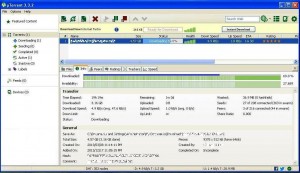 Like the most wildly used word on the web for 2013, torrents have similarities with “Error Code 404.” Normal day to day browsing or searching for items on the web, be it, reviews for books, movies or music via any search engine will likely return or list an alternative link to a torrent file readily available for download for the queried item.
Like the most wildly used word on the web for 2013, torrents have similarities with “Error Code 404.” Normal day to day browsing or searching for items on the web, be it, reviews for books, movies or music via any search engine will likely return or list an alternative link to a torrent file readily available for download for the queried item.
Torrents enable users to share files or distribute large media files. It is because of this reason why torrents are so popular and are the primary means of sharing or trading movies, software, music, electronic books to name a few. The problem with torrents is the type of material or files shared and it’s for this reason why torrents are unpopular with copyright authorities like RIAA (Recording Industry Association of America) and MPAA (Motion Picture Association of America), their major concern is copyright infringement. Most torrent sites host or distribute pirated materials. Not all torrents are illegal though, most Open Source based projects distribute their software as torrents, as an example, Linux Tracker. The difference is the copyright laws. Most vendors listed under LinuxTracker’s copyright laws promote making copies, reproducing and distributing their software. This is were organisations like MPAA draw the line. Majority of their materials are duplicated, reproduced and distributed via the bit-torrenting system without the permission of the copyright holder.
Research has shown that most people turn to illegal downloading of torrents because of the following reasons;
- Cost of items downloaded is out of reach for the downloader on the official market
- Unavailability of the materials in the downloaders region
- Some downloaders take this route because they claim there is so much stuff out there, they say you can’t buy it all, so at times you just have to download some
- Some downloaders say they don’t make good movies or music anymore so why bother buying, I might as well download for free.
Following the mushrooming of torrent sites, the MPAA, Anti-Piracy organisations and Copyright authority organisations have successfully cracked down on some of the big sites to a point where the torrent sites were forced to shutdown. Some popular and big torrent sites that shutdown are: www.btjunkie.org, www.isohunt.com and www.megaupload.com.
Shutting down of sites has led people to seek more alternatives. More torrent sites keep appearing on the web space! But do people really know what happens when they use or download torrents? Torrents, what you need to know (just to list a few):
- Some Copyright authorities and Anti-Piracy organisation are constantly monitoring torrents, their traffic and logging I.P Addresses of illegal downloaders. In some cases, depending with the region, forward the I.P Addresses to the relevant Internet Service Providers and demand that the ISP issue warning letters to the customers (downloader in question) to stop the illegal activities.
- Arrests have been made in some cases where after constantly monitoring particular torrents the downloaders were tracked down
- Not all torrent peers are in it for sharing purposes, black hat hackers disguising as seeders, leechers or part of the swarm find it easier to target and harvest I.P Addresses which they can then proceed to scan against for open ports, vulnerabilities or services. If successful, can proceed to exploit the machines behind the I.P Addresses and install malicious software for purposes like running Botnets, Spam Bots, SMTP Relay attacks or steal private data off the machine(s)
- Not all torrents are genuine, some torrent files contain malicious code, malware, trojan horses and once installed can lead to the machine being backdoored or vulnerable hence hackers can connect back to it and use it for different purposes. As an example, the machine becomes a zombie that awaits commands from a Command and control server to attack other machines. These infected machines form part of a botnet.
- Torrents generate a lot of (noise) traffic, chances are if you are a heavy downloader, your ISP is probably shaping or throttling your traffic. This way one’s quick and speedy browsing experience is affected. At times if its a shared connection it affects other users browsing experience on your network, be it at home or at work.
- To make things worse, if at work, organisations can end up having their I.P Address blacklisted causing inconveniences like external mails not being delivered. Losses can be incurred, as we know most organisations businesses revolve around emails.
Torrents are illegal but that’s not the reason for this post, I mean there is really no point in repeating what everyone has said about them being illegal. The bottom line is, no matter the justification, I am personally amused by people who always justify the reasons behind piracy or stealing of digital products. People should understand that there is more to it than just downloading torrents. It’s what happens behind the scenes. Torrents might appear like they are for free but truth be told, nothing is for free! If everyone can see your I.P Address when torrenting, let alone the government, how much are you revealing out there, who knows what’s next? I do not encourage people to download torrents. Think positively and be considerate, let’s support each other legally, digitally…!!!

1 thought on “Torrents, what you need to know!”